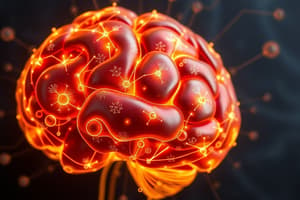Podcast
Questions and Answers
What is cognitive psychology primarily concerned with?
What is cognitive psychology primarily concerned with?
- Empirical investigation of mental processes and brain structures (correct)
- The physiological aspects of human development
- The development of emotional intelligence
- The influence of social behavior on thoughts
How does a mental set affect problem-solving?
How does a mental set affect problem-solving?
- It enhances creativity in finding solutions
- It simplifies complex problems into manageable tasks
- It allows for multiple perspectives on the problem
- It constrains alternative approaches to the problem (correct)
What is demonstrated by the Bruner Potter paradigm?
What is demonstrated by the Bruner Potter paradigm?
- Out of focus images can impair identification due to mental set (correct)
- Very out of focus images are easier to recognize than clear ones
- Highly familiar images are easier to recognize than new ones
- Images presented with noise improve memory retention
What defines 'zeitgeist' in the context of psychology?
What defines 'zeitgeist' in the context of psychology?
What characterizes an insight problem?
What characterizes an insight problem?
What is the primary focus of structuralism in understanding the mind?
What is the primary focus of structuralism in understanding the mind?
Which of the following methods is NOT associated with functionalism?
Which of the following methods is NOT associated with functionalism?
What criticism is associated with introspection as a method of studying the mind?
What criticism is associated with introspection as a method of studying the mind?
Who is considered the main proponent of structuralism?
Who is considered the main proponent of structuralism?
William James contributed to psychology by emphasizing which concept?
William James contributed to psychology by emphasizing which concept?
What misconception does functionalism challenge regarding psychological processes?
What misconception does functionalism challenge regarding psychological processes?
Which statement reflects a limitation of structuralism?
Which statement reflects a limitation of structuralism?
In the context of psychological methods, which process is focused on by cognitive psychology?
In the context of psychological methods, which process is focused on by cognitive psychology?
What is the main characteristic of sensory memory?
What is the main characteristic of sensory memory?
Which statement accurately defines short-term memory?
Which statement accurately defines short-term memory?
What does the term 'perception' refer to in the context of sensation and perception?
What does the term 'perception' refer to in the context of sensation and perception?
What principle is illustrated by the concept of size constancy?
What principle is illustrated by the concept of size constancy?
What do depth cues allow us to determine?
What do depth cues allow us to determine?
What is a key idea behind Gestalt psychology?
What is a key idea behind Gestalt psychology?
Which of the following best describes long-term memory?
Which of the following best describes long-term memory?
What characterizes the fading of long-term memory compared to short-term memory?
What characterizes the fading of long-term memory compared to short-term memory?
What is the main reason people mind-wander while reading?
What is the main reason people mind-wander while reading?
Which of the following best describes subliminal perception?
Which of the following best describes subliminal perception?
What does the rebound effect refer to in the context of thought suppression?
What does the rebound effect refer to in the context of thought suppression?
Which level of consciousness involves one’s explicit understanding of ongoing experience?
Which level of consciousness involves one’s explicit understanding of ongoing experience?
What is the primary characteristic of controlled processes?
What is the primary characteristic of controlled processes?
What does the Word Superiority Effect suggest about letter recognition?
What does the Word Superiority Effect suggest about letter recognition?
What is meant by 'change blindness'?
What is meant by 'change blindness'?
What is a significant consequence of inattentional blindness?
What is a significant consequence of inattentional blindness?
According to James Gibson's Ecological Approach, what is highlighted in perception?
According to James Gibson's Ecological Approach, what is highlighted in perception?
What are optical flow patterns primarily concerned with?
What are optical flow patterns primarily concerned with?
Which statement best describes 'change blindness blindness'?
Which statement best describes 'change blindness blindness'?
How do bottom-up processes contribute to visual perception?
How do bottom-up processes contribute to visual perception?
What is the impact of overactive top-down processing on visual perception?
What is the impact of overactive top-down processing on visual perception?
Flashcards are hidden until you start studying
Study Notes
Cognitive Psychology
- The empirical investigation of mental processes and brain structures involved in acquiring, encoding, using, and storing information.
Zeitgeist & Psychology
- The Zeitgeist is the prevailing intellectual and cultural climate of an era.
- The ideas of the time are often reflected in fashion, popular music, and other aspects of culture.
- Zeitgeist also impacts how individuals perceive the world and research in psychology.
Mental Set
- It’s a set of assumptions and perspectives that influence problem-solving.
- Can hinder innovative approaches.
- Bruner Potter paradigm illustrates how mental sets influence visual recognition, making it difficult to identify images presented in a blurry manner.
Insight Problems
- They require overcoming mental sets to find solutions.
- Often associated with an “aha” experience.
- The history of psychology is influenced by mental sets, as they govern the dominant school of thought and research.
Schools of Thought in Psychology
- Structuralism: Focused on analyzing the mind into fundamental elements.
- Methods: Introspection.
- Central Figure: Wilhelm Wundt.
- Limitations: Results were subjective and difficult to replicate.
- Functionalism: Investigated the purposes and functions of mental processes.
- Methods: A combination of introspection, observation, and experimentation.
- Central Figure: William James.
- Key Concept: The "stream of consciousness" emphasizes the dynamic and fluid nature of mental processes.
Information Processing Model
- The information processing model views the mind as a structured system with different stages.
- Sensory Memory: Briefly holds sensory information (large capacity, fades quickly).
- Short-Term Memory: Temporarily stores a limited amount of information (7 +/- 2 items, fades quickly).
- Long-Term Memory: Stores information for extended periods (unlimited capacity, fades slowly).
Sensation and Perception
- Distinguishes between:
- Sensation: Detecting sensory information.
- Perception: Interpreting sensory information.
Basic Perceptual Phenomena
- Size Constancy: Our perception of an object’s size remains relatively constant, regardless of viewing distance.
- Shape Constancy: We perceive an object's shape consistently, even with changes in orientation or angle.
- Depth Cues: Monocular (one eye) and binocular (two eyes) cues provide distance estimations.
- Gestalt Psychology: The whole is more than the sum of its parts. Emphasizes the dynamic nature of perception where we seek the best interpretation of available information.
Gestalt Principles
- Explain how we perceive visual information.
- The Word Superiority Effect: Recognizing letters quicker in words than in isolation.
- Change Blindness: We fail to notice changes in objects or scenes.
Change Blindness & Inattentional Blindness
- Attributed to:
- Top-Down Processing: Conceptual understanding influences perception, often hindering the detection of changes.
- Importance of Bottom-Up Processing: James Gibson's ecological perception theory emphasizes how environmental features guide perception.
- Optical Flow Patterns: Helps with navigation.
- Inattentional Blindness: We fail to notice unexpected but obvious objects.
- Implications:
- Our visual system excels at recognizing the overall picture of the scene.
- Top-down processes can mask significant details.
Controlled Processes and Levels of Consciousness
- Controlled Processes: Conscious, deliberate, and resource-intensive mental operations.
- Levels of Consciousness:
- Non-Conscious: Below the surface of awareness (e.g., automatic priming of words).
- Experiential Consciousness: Ongoing experience (e.g., current thoughts).
- Meta-Consciousness: Explicit understanding of the contents of experience (e.g., realizing you've been mind wandering).
Mind Wandering
- Occurs when our mind drifts from a task.
- Can be explained by an absence of meta-conscious awareness.
- Lucid Dreaming: Conscious awareness during a dream.
- Subliminal Perception: The effects of stimuli presented below the threshold of conscious awareness.
- Priming: Exposure to a stimulus (prime) influences subsequent processing of related stimuli.
Unconscious Priming and Consciousness Control
- Unconscious Priming: Automatic priming happens without conscious effort.
- Thought Suppression: Actively trying to avoid specific thoughts.
- Rebound Effect: Thought suppression can paradoxically increase the likelihood of those thoughts emerging.
Studying That Suits You
Use AI to generate personalized quizzes and flashcards to suit your learning preferences.



